
a world completely glued to itself
Director Victoria Remetey
Countries Austria
Duration 37 min
Synopsis
“I wanted to show why this country is the way it is.” Hungarian filmmaker Lívia Gyarmathy made this personal intention the challenging leitmotif of her films about socialist Hungary. In 1961, after finishing her studies of chemistry and a career as a skilled worker in a factory, she was the first woman to enroll in direction at Hungary's Academy for Theater and Film Art. Despite the prejudices of her professors and fellow students, she made a number of documentary and fiction films that stand out due to their social realism. Gyarmathy expressed her doubts about the socialist system through personal stories, as a result of which she was repeatedly targeted by the censors. With a great deal of sensitivity she explored the wounds in Hungarian society and the extent to which the country's citizens are willing to examine and deal with them. For example, she was the first person ever to address the theme of drugs, in her documentary Kilencedik emelet (Ninth Floor, 1977). The film’s invitation to the short-film festival in Oberhausen, Germany, improved matters with the censors. Thanks to her film about Roma in Hungary, co-produced by German broadcaster ZDF, the attention she received in the West protected her from more drastic censorship in Hungary. Shortly before the fall of the Iron Curtain, Gyarmathy made a three-part documentary about the Recsk labor camp (1988), another delicate subject in Hungary's history. In numerous interviews with Gyarmathy, Austrian historian Victoria Remetey’s film portrays both the complex structures of the socialist system in Hungary and also the conditions under which the country's filmmakers were forced to work. (Christa Auderlitzky)
“I wanted to show why this country is the way it is.” Hungarian filmmaker Lívia Gyarmathy made this personal intention the challenging leitmotif of her films about socialist Hungary. In 1961, after finishing her studies of chemistry and a career as a skilled worker in a factory, she was the first woman to enroll in direction at Hungary's Academy for Theater and Film Art. Despite the prejudices of her professors and fellow students, she made a number of documentary and fiction films that stand out due to their social realism. Gyarmathy expressed her doubts about the socialist system through personal stories, as a result of which she was repeatedly targeted by the censors. With a great deal of sensitivity she explored the wounds in Hungarian society and the extent to which the country's citizens are willing to examine and deal with them. For example, she was the first person ever to address the theme of drugs, in her documentary Kilencedik emelet (Ninth Floor, 1977). The film’s invitation to the short-film festival in Oberhausen, Germany, improved matters with the censors. Thanks to her film about Roma in Hungary, co-produced by German broadcaster ZDF, the attention she received in the West protected her from more drastic censorship in Hungary. Shortly before the fall of the Iron Curtain, Gyarmathy made a three-part documentary about the Recsk labor camp (1988), another delicate subject in Hungary's history. In numerous interviews with Gyarmathy, Austrian historian Victoria Remetey’s film portrays both the complex structures of the socialist system in Hungary and also the conditions under which the country's filmmakers were forced to work. (Christa Auderlitzky)